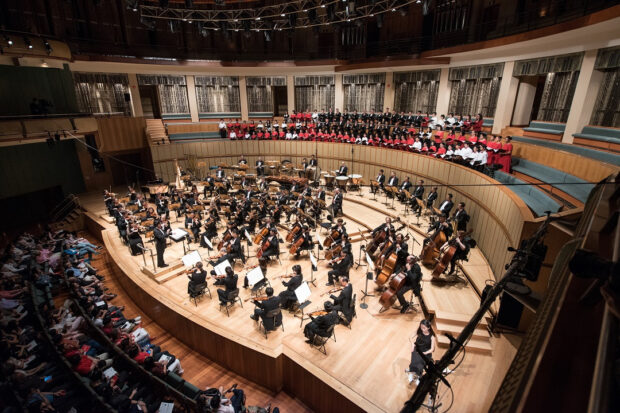
The past month is now a blur. The flurry of news. Waking up each morning to a new twist. Trying to make sense of a strange new disease.
I encountered numerous crisis simulations and case studies in previous jobs and in business school, but when a real evolving "unknown" hits, it's still never the same. One pushes away an instinctive fear of the unknown by grabbing at processes, tools, data and anything that forces rational thinking to develop plans.
Amid the evolving coronavirus situation in Singapore, my team and I were often asked, "Will the Singapore Symphony Orchestra (SSO) cancel its concerts?" Patrons, donors, staff, musicians of the SSO, and many other stakeholders were worried and concerned. On the day the Disease Outbreak Response System Condition (Dorscon) level turned orange, the frequency of the questions increased.
It was fortunate that, as the national orchestra, the SSO is plugged into the Government's crisis management network, which facilitates information flow, clarity and support in interpreting the public health advisories of the Ministry of Health (MOH).
Since that day, we have continued with all our concerts, all the while watching the situation carefully to ensure that the health of our musicians, staff and audience members is not put in danger. Without a doubt, if community spread of the Covid-19 disease were to become prevalent, or Dorscon goes to red, continuing with concerts would put everyone at risk, which we would never do.
The most important question we had to answer was whether it was safe to proceed with our concerts. The Feb 8 MOH advisory on large-scale events called for a set of precautions to minimise the chances of a sick person showing up at events with more than 1,000 attendees. One point discussed widely among the arts community here was the opening paragraph, which called for organisations to cancel or defer non-essential large-scale events.
I am sure that some members of the public would consider an arts event non-essential. However, for an organisation like the SSO, in the first place, putting on large-scale events is part of our central mission.

- the most important question we had to answer was whether it was safe to proceed with our concerts.
And I want to present three reasons why the arts in general, and classical music concerts in particular, are essential even during times of crisis for a modern and complex society like Singapore.
First, it is important to maintain an environment of normalcy as life goes on. The MOH's definitions of Dorscon yellow and orange both describe a situation when there is no evidence of widespread community transmission, but just with different levels of precaution. Both levels recommend "minimal disruption" and not for the country to come to a standstill.
The SSO is sometimes described as the cultural heartbeat of the nation because of the weekly tempo of our appearances in the cultural calendar, providing music in and outside of the concert hall 46 weeks a year. When something so regular is cancelled, it would mark a shift in the pulse of the city.
Second, music feeds the soul. I believe the arts play a special role that nothing else comes close to matching. After a week of working through business continuity plans, I attended a run of Wild Rice's The Importance Of Being Earnest, and watching the craftsmen on stage bring Oscar Wilde's wit to life gave me a two-hour space to breathe and re-energise.
In the same way, audience members have commented that the two SSO concerts in the past fortnight were soul-lifting. We know that we fill this need and that the need is real because people showed up for these concerts and, more remarkably, continued to buy tickets even after the Dorscon orange announcement. As Straits Times critic Marc Rochester noted about our performance with violinist Tasmin Little (Feb 17): "Perhaps, in this time of unease, these two hours of calm geniality were just the tonic the audience needed."
Third, the arts can help you cope with uncertainty. As I have described, our rational side often deals with the unknown by looking for anything that we can apply logic to - to link cause and effect.
As a pure Stem (science, technology, engineering and mathematics) student all the way to university, I certainly grew up struggling with uncertainty. But the arts and the humanities present you with different perspectives to view the uncertainties. By the end of a symphony, sometimes things become clearer. Sometimes they do not, but the music would have held your fears in abeyance for the duration. One Straits Times Forum writer, Dawn Chen Wenhui, put it best (Feb 20): "In times like this, the arts can serve as a positive reinforcement in coping with life's challenges and uncertainties."
For me, this is like building our psychological resilience. The arts help you to surrender yourself to the unknown, and the beauty of a piece of art or music reinvigorates your belief that, as human beings, we have the ability to transcend today's problems and attain greatness.
Chng Hak-Peng is the CEO of the Singapore Symphony Group.
This article first appeared on The Straits Times on 25 February 2020
Source: The Straits Times © Singapore Press Holdings Limited.
Reprinted with permission.
The SSO is dedicating its free concert on 15 March 2020 to all healthcare-givers and frontline staff.
*There will be precautionary measures such as streamlining of entry points and screening of temperature.